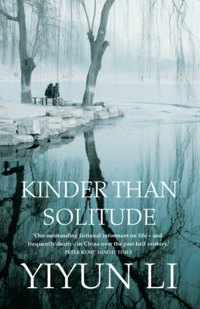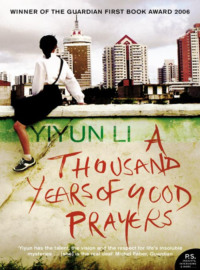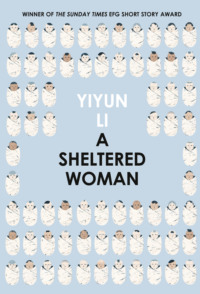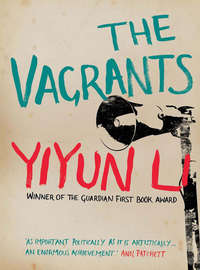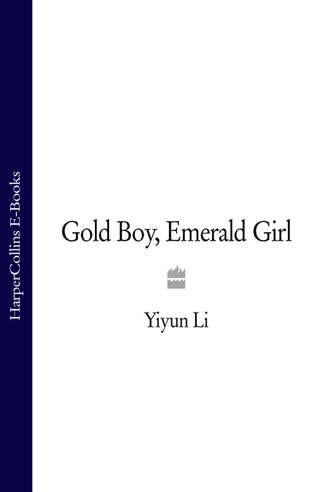
Полная версия
Gold Boy, Emerald Girl

YIYUN LI
Gold Boy, Emerald Girl
FOURTH ESTATE • London
For Brigid Hughes
Contents
Cover
Title Page
Kindness
A Man Like Him
Prison
The Proprietress
House Fire
Number Three, Garden Road
Sweeping Past
Souvenir
Gold Boy, Emerald Girl
Acknowledgement
ABOUT THE AUTHOR
Also by Yiyun Li
ABOUT THE TYPE
Copyright
About the Publisher
Kindness
ONE

I have not married, and naturally have no children. I have few friends, though as I have never left the neighborhood, I have enough acquaintances, most of them a generation or two older. Being around them is comforting; never is there a day when I feel that I am alone in aging.
I teach mathematics in a third-tier middle school. I do not love my job or my students, but I have noticed that even the most meager attention I give to the students is returned by a few of them with respect and gratitude and sometimes inexplicable infatuation. I pity those children more than I appreciate them, as I can see where they are heading in their lives. It is a terrible thing, even for an indifferent person like me, to see the bleakness lurking in someone else’s life.
I have no hobby that takes me outside my flat during my spare time. I do not own a television set, but I have a roomful of books at least half a century older than I am. I have never in my life hurt a soul, or, if I have done any harm unintentionally the pain I inflicted was the most trivial kind, forgotten the moment it was felt—if indeed it could be felt in any way. But that cannot be a happy life, or much of a life at all, you might say. That may very well be true. “Why are you unhappy?” To this day, if I close my eyes I can feel Lieutenant Wei’s finger under my chin, lifting my face to a spring night. “Tell me, how can we make you happy?”
The questions, put to me twenty-three years ago, have remained unanswerable, though it no longer matters, as, you see, Lieutenant Wei died three weeks ago, at forty-six, mother of a teenage daughter, wife of a stationery merchant, veteran of Unit 20256, People’s Liberation Army, from which she retired at forty-three, already afflicted with a malignant tumor. She was Major Wei in the funeral announcement. I do not know why the news of her death was mailed to me except perhaps that the funeral committee—it was from such a committee that the letter had come, befitting her status—thought I was one of her long-lost friends, my name scribbled in an old address book. I wonder if the announcement was sent to the other girls, though not many of them would still be at the same address. I remember the day Lieutenant Wei’s wedding invitation arrived, in a distant past, and thinking then that it would be the last time I would hear from her.
I did not go to the funeral, as I had not gone to her wedding, both of which took place two hours by train from Beijing. It is a hassle to travel for a wedding, but more so for a funeral. One has to face strangers’ tears and, worse, one has to repeat words of condolence to irrelevant people.
When I was five, a peddler came to our neighborhood one Sunday with a bamboo basket full of spring chicks. I was trailing behind my father for our weekly shopping of rationed food, and when the peddler put a chick in my palm, its small body soft and warm and shivering constantly, I cried before I could ask my father to buy it for me. We were not a rich family: My father worked as a janitor, and my mother, ill for as long as I could remember, did not work, and I learned early to count coins and small bills with my father before we set out to shop. It must have been a painful thing for those who knew our story to watch my father’s distress, as two women offered to buy two chicks for me. My father, on the way home, warned me gently that the chicks were too young to last more than a day or two. I built a nest for the chicks out of a shoe box and ripped newspaper, and fed them water-softened millet grains and a day later, when they looked ill, aspirin dissolved in water. Two days later they died, the one I named Dot and marked with ink on his forehead the first one to go, followed by Mushroom. I stole two eggs from the kitchen when my father went to help a neighbor fix a leaking sink—my mother was not often around in those days—and cracked them carefully and washed away the yolks and whites; but no matter how hard I tried I could not fit the chicks back into the shells, and I can see, to this day, the half shell on Dot’s head, covering the ink spot like a funny little hat.
I have learned, since then, that life is like that, each day ending up like a chick refusing to be returned to the eggshell.
I was eighteen when I entered the army. Lieutenant Wei was twenty-four, an age that I now consider young, though at the time she seemed much older, a lifetime away from me. The day I arrived at the camp, in a midsize city plagued by hepatitis and pickpockets, I came with a single half-filled suitcase. The army had sent an extensive list of supplies that would be issued to us: toothbrushes and towels and washbasins, mess kits, thermoses to be shared among a squad, uniforms for all seasons—we used to joke that, had the army known the sizes of our bras, they would have ordered them too, dyed the same green as our socks and underpants.
A few men and women in uniform loitered under a tree. I had taken a night train, making a point of leaving home and arriving at the camp at the earliest time allowed. My father had seen me off at the train station, shaking my hand solemnly through the open window when the train whistled its signal of departure; my mother had not come, citing illness, as I had known she would.
After I registered, a woman officer, about a head taller than I was, her hair cropped short, introduced herself as Lieutenant Wei, my platoon leader. She had on a straw-colored uniform shirt buttoned to the top, dark green woolen pants, and a crimson tie. I did not cringe under her severe stare; I had lived, until then, beneath the unrelenting eyes of my mother. Decent if not strikingly beautiful—sometimes during a meal she would study my face and comment on it; in the evenings when my father was working the night shift, she would remark on my adequately developed curves. I had learned that if one remained unresponsive in those situations one could become transparent; when my mother’s eyes peeled off my clothes piece by piece they would meet nothing underneath but air.
After I changed into my uniform, Lieutenant Wei ordered me to mop the barracks. Yes, I replied; yes, Lieutenant, she corrected me. Yes, Lieutenant, I replied readily, and she looked at me for a long moment, then turned around as if disgusted by my lack of defiance.
I was the first one of our platoon to have arrived, and I walked through the aisles between the bunk beds, studying the names taped to the metal frames. The company was housed in a three-story building, with each platoon occupying a long floor and bunk beds lining both walls, separated into four squads by washstands and desks. I would be sharing a bunk bed with a girl named Nan: We each had a white sheet, underneath which was a thin straw mattress; a quilt and a blanket, both dark green, folded as though they were sharply cut tofu. There was no pillow, and soon we would all learn to wrap up our outside clothes—dresses and shirts that were forbidden in the barracks—into pillows at night. Next to my bed was a window opening to the courtyard, where trees whose names I had yet to learn stood in a straight line, their branches pointing upward in a uniform manner.
Lieutenant Wei came back later and ran a palm over the floor. Do not think this is your home, she said, adding that I’d better prepare to shed a few layers of skin. When she ordered me to mop the floor again, I replied, “Yes, Lieutenant.”
“Louder,” she said. “I can’t hear you.”
“Yes, Lieutenant.”
“I still can’t hear you,” she said.
“Yes, Lieutenant,” I said.
“You don’t have to yell in my face. A respectful and clear reply is all we need here.”
“Yes, Lieutenant,” I said. She stared at me for a long moment and said that a soldier shed sweat and blood but never tears. I waited until she left before I dried my face with my sleeve. It was my father’s handshake through the open window that I had cried for, I told myself, and swore that I would never again cry in the army.
TWO
A DREAM HAS occurred repeatedly over the past twenty years, in which I have to give up my present life and return to the army. Always Lieutenant Wei is in the dream. In the early years she would smile cruelly at me. Didn’t I tell you that you would be back? The question was put to me in various ways, but the coldness remained the same. The dreams have become less wicked as the years have gone by. I’m back, I tell Lieutenant Wei; I always knew you would come back, she replies. We are older, having aged in my dreams as we have in real life, the only remnants of a previous life among a group of chirrupy teenage girls.
These dreams upset me. Lieutenant Wei’s marriage, two years after I had left the army, and her transfer to another city, which would know her only as a married woman and later a mother, and then would see her die, must have wiped her history clean so she could start collecting new memories not about young, miserable girls in the camp but about happy people who deserved to be remembered. I never showed up in her dreams, I am certain, as people we keep in our memories rarely have a place for us in theirs. You may say that we too evict people from our hearts while we continue living in theirs, and that may very well be true for some people, but I wonder if I am an anomaly in that respect. I have never forgotten a person who has come into my life, and perhaps it is for that reason I cannot have much of a life myself. The people I carry with me have lived out not only their own rations but mine too, though they are innocent usurpers of my life, and I have only myself to blame.
For instance, there is Professor Shan. She was in her early sixties when I met her—but this may be the wrong way to put it, as she had lived in the neighborhood for as long as my father had. She must have watched my generation grow up, and studied every one of us before singling me out—I like to imagine it that way; you see, for a lonely woman, it is hard not to make up some scenario that allows her to believe herself special in some minor way.
Professor Shan was in her early sixties and I was twelve when she approached me one September evening. I was on my way to the milk station. “Do you have a minute?” she asked.
I looked down at the two empty bottles, snuggled in the little carrier my father had woven for me. He had painted the dried reed different colors, and the basket had an intricate pattern, though by then the colors had all paled. My father had a pair of hands that were good at making things. The wooden pegs he put on the foyer wall for my school satchel and coat had red beaks and black eyes; the cardboard wardrobe had two windows that you could push open from the inside, a perfect place for me to hide. He had built my bed too, a small wooden one, painted orange, just big enough to fit in the foyer alongside the wardrobe. We lived in a small one-room unit, the room itself serving as my parents’ bedroom, the foyer my bedroom; there was a small cube of kitchen and a smaller cube of bathroom next to the foyer. Later it occurred to me that we could not afford much furniture, but when I was young I thought it was a hobby of my father’s to make things with his own hands. Once upon a time he must have made things for my mother too, but from the time my memory begins, their bedroom had two single beds, my father’s bare and neatly made and my mother’s piled with old novels, perilously high.
“Do you have a minute? I am asking you,” the old woman said again. I had developed a look of distractedness by then, and she was not the most patient woman.
I was on the way to the milk station, I stammered. “I’ll wait for you here,” she said, tapping on the face of her wristwatch with a long finger.
When I was out of her sight I took my time examining the trees by the roadside, and the last blossoming wildflowers. The line at the milk station was long, and that was what I told her when I reported back to her late. I addressed her as Teacher Shan, and she corrected me, telling me to call her Professor Shan. She led me up flights of stairs to her flat on the fifth floor. It did not occur to me that there was anything odd about this. The only thing my mother had warned me about, when I had had my first period a month earlier, was not to spend time alone with a man.
Professor Shan’s place, a one-room unit also, seemed more crowded than ours even though she lived there by herself. Apart from a table, a chair, and a single bed, the room was filled with trunks: dark leather ones with intricate patterns on the tops and sides, wooden ones with rusty metal clips, and two matching trunks—once bleached but by then more yellow than white—made of bamboo or perhaps straw, I couldn’t tell which. On each trunk there were books. She moved a pile of books to make a spot for me to sit on her single bed, and then took a seat in the only chair in the room. Up to that point I had not studied her, but I realized now that she was a beautiful woman, even at her age. Her hair, grayish white, was combed into a tight bun, not a single strand running loose. Her face—the high cheekbones, the very prominent forehead, and the deep-set eyes—reminded me of a photograph of a female Soviet pilot in my textbook. I wondered if Professor Shan had some mixed blood. It was a secret joy of mine to study people’s faces. I must take after my mother, who, apart from studying my face at meals—the table placed between the two beds in my parents’ bedroom—rarely took a bite. Sometimes, waiting for us to finish eating, she would comment on the people passing by outside our window: Oily and puffy as fresh fried dough, she described a woman living a floor above us; the man next door had a long and bitter-looking face, like a cucumber.
My mother was the prettiest woman I had known until then, with almond-shaped eyes in a small, heart-shaped face, a straight and delicate nose, and, as I later learned from her collection of romantic novels from the early 1900s, a cherry-petal mouth. When she grew tired of watching the world, she would study her own face in an oval mirror that she kept close to her all day long. “A princess trapped in the fate of a handmaiden,” she would say to no one in particular. My father, eating silently, would look up at her with an apologetic smile, as if he were a parent responsible for his child’s deformed body.
My father had married late in his life, my mother early, he at fifty and she at twenty. Two years later they had me, their only child. When I was in elementary school, other children often mistook him for my grandfather, but perhaps that was because he had to be a parent to my mother, too. Together my mother and I made my father grow old fast. You could see that in his stooped back and sad smile.
“Do you always let your mind wander in front of your teachers?” Professor Shan asked, though I could see the question was more an amusement than a criticism. In her youth, she must have been more beautiful than my mother. I wondered what my mother would think, if she knew my opinion. One thing I was certain of was that my mother would not get along well with Professor Shan, eccentricity being both women’s prized possession.
I was aware of Professor Shan’s existence as much as I was aware of the other people in the neighborhood: If you live in one place long enough, you do not need to seek gossip and rumors; stories, all sorts of tales, will come to find you. Even for a family like ours, with a mother who rarely talked to people and a father who was, in my mother’s words, quiet as a dead log, stories would come in eavesdropped form while I waited in lines—and it seems that I spent my childhood perpetually in lines, waiting for eggs, cooking oil, meat, soap, milk, and other rationed goods, waiting to pay the rent and utilities, waiting to get my mother’s prescription filled at the pharmacy. That was where I had first heard bits and pieces of Professor Shan’s story, even before I met her: She had taught high school English in another district before her retirement. She had a son and a daughter, who, after graduating from college, had both vanished, reappearing every once in a while as visitors from America. People could not agree on how they had managed to leave the country, though the most reasonable explanation was that Professor Shan had relatives on her mother’s side who had fled to the States. Once upon a time there had been a husband, a much friendlier person than Professor Shan, but he had disappeared, too, and it was said that he had been sent to the American relatives just as their children had been; it was also said that he had taken up with a younger woman and started a Chinese restaurant with her in New York City, which might be true, as he was never seen in the neighborhood again.
In any case, sitting in Professor Shan’s room on that first day, I could not imagine that the place had once been occupied by a family. There were no framed photographs or letters bearing foreign addresses, and the room, packed with the trunks, seemed too small even for Professor Shan by herself. She studied me while I looked around the room, then picked up an old book and turned to a random page. “Read the line to me,” she said. The book was the first one in a series called Essential English, which Professor Shan had used to learn English fifty years ago. The page had a small cartoon of a child on a seat, the kind one would find in a luxury theater. In the cartoon, the child, who was not heavy enough to keep the seat from folding back, smiled uncertainly on his high perch, and I felt the same. I had entered middle school earlier that month, and had barely learned my alphabet.
When I could not read the caption, Professor Shan put the book back with the other volumes, their spines different colors that were equally faded. “You do know that you are not your parents’ birth daughter, don’t you?” She turned and faced me. “And you do know that no matter how nicely they treat you, they can’t do much for your education, don’t you?”
I had not doubted my blood until then—I knew that my parents were different from most parents, but I had thought that it was their age difference, and my mother’s illness. Moyan: My mother sometimes said my name in a soft voice when my father was not around, and I would know that she had some secrets to tell me. A man can have children until he is seventy, she would say; a woman’s youth ends the moment she marries. Moyan, do not let a man touch you, especially here and here, she would say, gesturing vaguely toward her own body. Moyan, your father would get you a stepmother the moment I died, she would say, narrowing her eyes in an amused way; do you know I cannot die now because I don’t want you to live under a stepmother? In one of these revelatory moments she could have said, Moyan, you were not born to us; we only picked you up from a garbage dump—but no, my mother had never, even in her most uncharitable moment, said that to me, and in fact she kept the secret until her death, and for that alone I loved her, and love her still.
“If your parents haven’t told you this, someone else must,” Professor Shan said when I did not reply. “One needs to know where she came from, do you understand?”
In my confusion I nodded. I am fortunate to be slow in responding to news—I have avoided much drama in my life, as the impact, if there is any, comes much later, in solitary meditation.
“I was an orphan myself.” Slowly, over the next three years, her story would come in full. Her mother, a woman who had stayed unmarried to take care of her own aging parents, had inherited their small china shop when they died; by then she was too old to get married. She went to a Shanghai orphanage in the deadly winter of 1928 and adopted the only girl who was not suffering pneumonia. She named the young girl Shan Shan; she had no family name, as there was not one she could claim. McTayeier School for Girls, the best school in Shanghai, was where Professor Shan had been educated, the school’s name spelled out for me to remember, “The McTayeierans,” the song she and her classmates had sung at school gatherings, sung to me. In her early twenties, Professor Shan had been hired by a teachers college but was fired when her dubious history was discovered. People who think they know their own stories do not appreciate other people’s mysteries, Professor Shan explained; that is why people like you and me will always find each other. Those words, first said to me in the early days of my visits, are what made me go back to her every day at five o’clock.
She read to me. She scoffed at my English textbook, and told me to start on the first volume of Essential English. She never checked my progress, and after a while I realized it did not make any difference to her that I only looked at the illustrations. Instead she read her collection of novels to me. We began with David Copperfield, she sitting in the only chair in the room, I on the bed. Intimidation kept me focused at first, as sometimes she would look up sharply in mid-sentence to see if my eyes were wandering to the trunks, or the trees outside. I worried that she would find me a fraud and dismiss me. I did not like her or dislike her yet, but I was in shock, unable to process the fact that I was not related by blood to my parents, and Professor Shan’s reading voice, with a melody that was not present when we talked, was soothing in a way that my mother’s voice never was. Professor Shan would read long passages, stopping only when she seemed pleased, and then translate for me. Her translation seemed shorter than the original English, but even those brief Chinese words gave me a joy that I did not get elsewhere—she used phrases that belonged to a different era, a language more for the ancients than the living, and before long I began to mimic her. I had never been a talkative person, but now I had even fewer words, for the ancients had the most efficient ways of saying things. My schoolmates found it laughable but I persisted, ignoring teenage slang for a mixture of language used in ancient poetry and eighteenth-century romance novels. My father, who was not an educated person, did not seem to find it odd, perhaps having little idea how education could change one’s speech, but my mother, more than once, studied me after my father and I exchanged some words. I knew I had invaded her territory—after all, she was the one who read ancient poetry and centuries-old novels to pass the time. She could not make up her mind about how to accept my change, I could see, just as I could not make up my mind about the news of her not being my birth mother.


